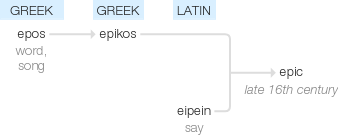Epic
late 16th century (as an adjective): via Latin from Greek epikos, from epos ‘word, song’, related to eipein ‘say’.
wiktionary
From Middle French épique, from Latin epicus, from Ancient Greek ἐπικός(epikós), from ἔπος(épos, “word, story”).
From epi-, from Ancient Greek ἐπί(epí, “on top of”).
etymonline
epic (adj.)
1580s, "pertaining to or constituting a lengthy heroic poem," via French épique or directly from Latin epicus, from Greek epikos, from epos "a word; a tale, story; promise, prophecy, proverb; poetry in heroic verse" (from PIE root *wekw- "to speak").
Extended sense of "grand, heroic" is recorded in English by 1731. From 1706 as a noun in reference to an epic poem, "A long narrative told on a grand scale of time and place, featuring a larger-than-life protagonist and heroic actions" [Miller Williams, "Patterns of Poetry"]. Earlier as "an epic poet" (1630s).
I believe the word 'epic' is usually understood by English readers to mean merely a long and grand poem instead of a short slight one—at least, I know that as a boy I remained long under that impression myself. It really means a poem in which story-telling, and philosophical reflection as its accompaniment, take the place of dramatic action, and impulsive song. [Ruskin, "Elements of English Prosody, for use in St. George's Schools," 1880]
